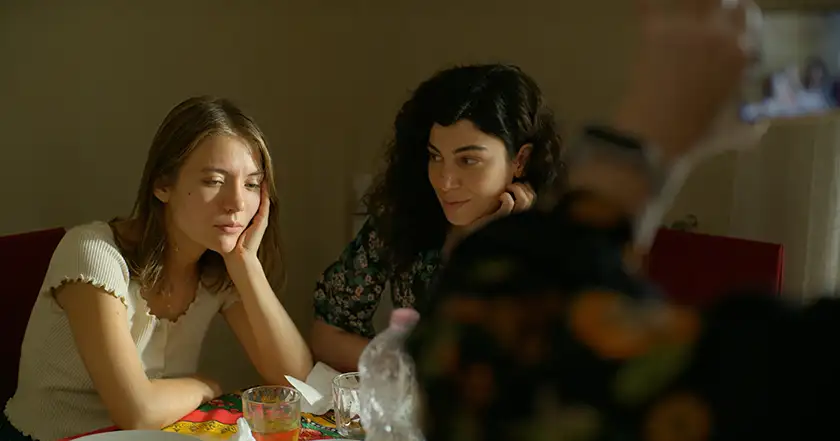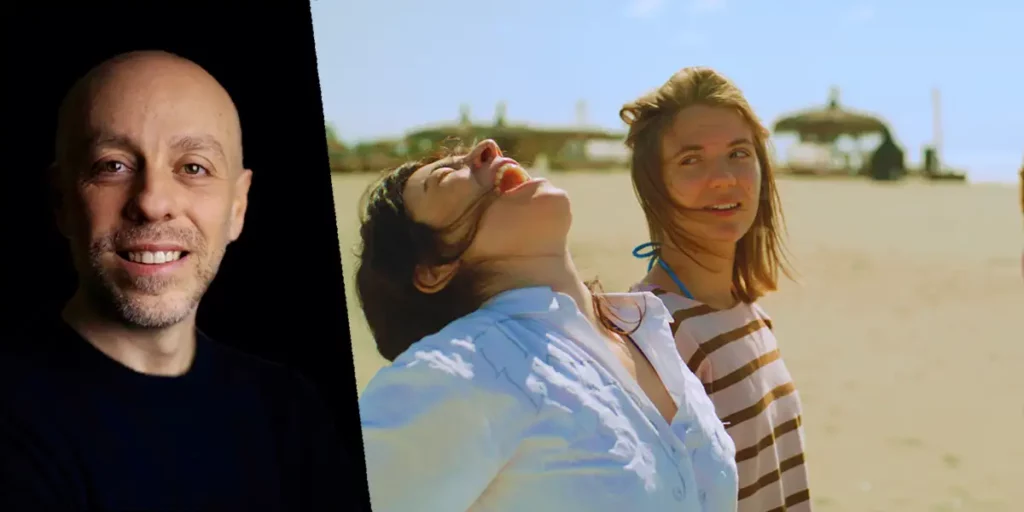We interview director Ciro De Caro about Taxi Monamour, his Venice award-winning film about an unlikely friendship, and his writing and filmmaking process.
Set in Rome during the summer, director Ciro De Caro’s Taxi Monamour follows its two main characters, Anna (Rosa Palasciano) and Cristi (Yeva Sai), as their friendship begins and blossoms in difficult situations. On one hand, Anna is fighting an illness she refuses to talk about with anyone, including her sometimes invasive but loving family. On the other hand, Cristi has come to Italy fleeing from the war in Ukraine but is debating going back to the country where her boyfriend still lives. The two seem to have very little in common and yet find each other in the unlikeliest of circumstances, despite their apparent differences.
Taxi Monamour won the People’s Choice Award at Giornate degli Autori at this year’s Venice Film Festival. We sit down with director Ciro De Caro to talk about his newest film and how he developed his characters and the relationship between them. Read our interview!
Ciro De Caro on how he first started working on Taxi Monamour and what inspires him
How did you first get the idea for the story of Taxi Monamour?
Ciro De Caro: I wrote this movie with Rosa [Palasciano], who also plays the main character. One day, we were walking on the beach and we saw these two women having lunch on the beach; we didn’t know why they were together, because they seemed to be completely different. They didn’t talk to each other, but they looked like they were so close. They were [sitting there] in silence, and we started wondering about the little coincidences of life.
You know, maybe we are born in two completely different parts of the world, but after 30 years or 50 years, you meet people and I’m scared that [if something goes differently] you wouldn’t meet them. We were curious about these two women: we started imagining things, and we were still thinking about them a few days later, so we thought, maybe we should have two characters and two stories. This is where we started from.
We have seen a lot of beautiful Italian films in Venice this year, but also historically I think that there’s such a rich tradition of filmmaking in Italy. Is there any director that you look up to, or any film that inspired you in your career or this film specifically, both in terms of Italian and international filmmaking?
C.D.C.: For Italian directors, I have to say Olmi, Antonioni, and De Sica. I studied cinema and I fell in love with the Nouvelle Vague, Truffaut, and Godard. I loved John Cassavetes so much. At the present moment, other current directors inspire me: Cristian Mungiu, the Dardenne brothers, and Alfonso Cuarón. I look at their movies for inspiration. I like something that stays with me, I don’t know, but that’s my inspiration.
Ciro De Caro on using Rome as the setting of Taxi Monamour
I also want to talk about Rome, because I think the setting is really important to the story of Taxi Monamour. Why did you choose Rome specifically and also why did you want to portray this side of the city? It is not something that I think people are very used to as it is not necessarily the touristic side of it.
Ciro De Caro: I love Rome, and I live there. I used to have a bad relationship with the city for many years, but now I’ve started to love it. I like to talk about what I know: there are places in Rome that I like; I also like touristy places, but they are always crowded. There are some neighbourhoods where I like to walk and grab a coffee. There is this thing that happens in Rome in the summer, in some neighbourhoods, where everybody goes away on vacation to the beach and you’re alone in the city; you can meet other people [who also stayed in the city].
You recognize the people who are lonely but are happy to be alone; it’s strange. They are happy to stay in a city where they can [actually live] for a few weeks in the year, and everything becomes their home because you don’t have to share Rome with too many people. I wanted to put the two characters in this situation, in a Rome that I like, in a Rome at the end of the summer. Rome is sad in the summer, but you can see something that other people never see; that’s something that I had to put in Taxi Monamour.
Ciro De Caro on using Rome as the setting of Taxi Monamour
Cristi is obviously a very interesting character: she’s Ukrainian and fleeing the war. Did you want to include some sort of commentary on the war and on the situation in Italy, which is a country that welcomed quite a lot of Ukrainian refugees with Taxi Monamour?
Ciro De Caro: When we started writing this movie, the war had not started yet. But when the war started, we talked about this, and we could not have the movie [exist in a vacuum]. I think that cinema must tell what is happening in the world. Taxi Monamour doesn’t look at what is going on in the world at this moment directly. We didn’t want to do a movie about the war, we didn’t want to do a movie about refugees, we wanted to do a movie about two women, about a friendship.
But we could not ignore what is going on and we put this in the background in a very light way because I think that big issues in the movie don’t need to be shown too much. It is stronger for me when those issues are invisible, it gives them more power. They are always there as a big weight upon our shoulders. That is why we had the story take place during the war.
I did not live the war on my own skin, but making movies allows me to explore these things. I didn’t know women very well, and that’s why I wanted to talk about women characters. Of course, I am able to do this with Rosa, but I always want to explore something that I’m not familiar with. Because I think if I’m curious about the things that I tell, maybe the audience who watches the movie will be curious too.
The friendship is at the heart of Taxi Monamour in many ways: the women are very different, but they find this very genuine connection. What do you think drives them to each other? And is there any similarity between their stories that you think people could notice?
C.D.C.: They seem so different, but they have a very similar condition. They have two big problems: Anna is sick, living with a condition that will probably drive her to death, and Cristi – she is played by Yeva who unfortunately has a similar story – escaped and ran away from death. Now they live in an apparent comfort zone because now Cristi is in Italy and Anna lives with a rich family. They seem to have no problem, but this comfort zone can be a cage for them.
For example, when a person says they love you, maybe this love can be too much or when a person wants to protect you, maybe they just want to keep you or own you. So they live in this condition and they recognise it in each other’s eyes. Maybe they find some courage from the other, they look at the other as a mirror and they understand that it is better to risk something – even risking dying – but live this life.

I really liked the relationship between Anna and her family. It felt very authentic, but also very unique to their circumstances in Taxi Monamour. How did you work on achieving that with the cast on set and in the writing?
C.D.C.: I think in Italy we have a problem with families, because they are always so present in our life; I know many stories about that. I could do – maybe I should do – a hundred movies with families, because they are all funny things; I like to talk about families, they are really inspiring to me. In this particular case, I wrote the story – I don’t remember if it was the “Parisian” or “The New Yorker” – where there was this guy in the United States who during a birthday party with the family, was talking about when he broke his arm.
His nephew had broken an arm and he was saying “I don’t remember when it was, but I was probably seven,” and the mum told him that no, he never broke his arm and that it was his brother. And the story said that he started researching documents to try and find pictures or medical reports to prove that he was right. There are many psychological cases of these where the mother or father would plant a memory in the children and due to their authority, everyone believes what they say even if one child does have that real memory. I wanted to include this in an Italian family. I know all the actors and thought they were perfect for this family.
Ciro De Caro on the themes of the film and what he hopes audiences get from Taxi Monamour
I think it’s very fascinating that one deals with war and one deals with illness, so, in the end, Taxi Monamour is about life and death. How did you choose these themes and did you always know the story was going to go in this direction?
Ciro De Caro: When I start writing a movie, I don’t usually have a subject, I don’t know what I’m going to talk about. I don’t have a pitch or high concept because I want to be curious. Otherwise, for me it’s boring and when I start with the subject, I never finish writing the screenplay. So I’d rather not know and let the characters show me what is going to happen. I start to write what I am seeing: I see people who are fighting or a woman who is crying at the bus stop, or elderly people who dance at a party, and I write it on a post-it or paper towel.
I put them on the table or in a box and after a year maybe I go back to them, read all the things, and I see that there is a connection. There are the characters in this connection and then there are other characters that make the themes come out. I don’t look for themes because, for me, the most important elements in a movie are the characters. They are real, they are living in this world, and they carry the themes with them.
Taxi Monamour premiered in Venice; what do you hope that audiences take away from this film when they watch it?
C.D.C.: When you meet some people when you are in love, or maybe with your parents or with a friend, sometimes you spend all your life without saying I love you, without saying something. And when it’s too late, you understand that you should have said something to those people. I hope that the audience will have the chance to learn that now is the moment I love you to the people that we love. Because maybe we can be separated for many reasons, and we cannot have a chance to say that anymore.

Ciro De Caro on his relationship with Rosa Palasciano and his future projects
You worked with Rosa before, in a previous film; she is also the writer and one of the main actors in Taxi Monamour. How would you describe your collaboration and how important is it that she co-wrote this with you?
Ciro De Caro: She’s very important. Without Rosa, Taxi Monamour would never exist. Not only because she helped me write female characters, but because we discussed a lot. Sometimes we would not talk for weeks: we don’t live together but maybe we don’t call because we are in a fight. I’m offended, she’s offended, so we don’t speak. She pushed me to go further and further and delve deep into things and characters so for me it’s a gift and I’m very lucky.
We started by talking about the coincidences of life and I’m scared if I think that if things were different, I would have never met Rosa. She’s so important to me, she’s a real friend and a very important person in my life and my work. I don’t know what is going to happen in the future, I don’t know if we will always do movies together because we didn’t plan this.
Do you have any future projects that you can talk about or what’s next for you in your career after Taxi Monamour?
C.D.C.: Oh, I don’t know! As I told you, I have that box with the ideas. When I finish the work of this movie, I can [look at them] because I can do just one thing. So I will sit at my desk with the pieces of paper and see if there is a connection. I don’t know if I will call Rosa or not. Maybe she will call me. I really don’t know yet, we’ll see.
This interview was edited for length and clarity.
Taxi Monamour had its World Premiere on September 3, 2024 at the Venice Film Festival, where it won the People’s Choice Award at Giornate degli Autori.

